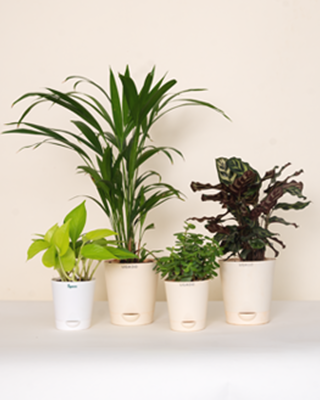For healthy growth and development, plants need the right nutrients. Essential nutrients like nitrogen, phosphorus, and potassium support vital functions such as photosynthesis, energy transfer, and cell division.
Adequate nutrition enhances disease resistance, improves yield, and ensures strong root and shoot development. However, deficiency in any nutrient can lead to stunted growth, poor health, and reduced productivity. Thus, proper nutrient balance is crucial for plant vitality and maximizing crop quality if you're growing produce plants.
Buy Plants
• What Kinds of Nutrients Do Plants Need?

Overall plants need 15 nutrients to grow properly. Out of these 15, the nutrient elements obtained from atmosphere i.e. through photosynthesis are:
- Hydrogen
- Carbon
- Oxygen
While the nutrient elements obtained from the soil are:
- Nitrogen
- Phosphorus
- Potassium
- Sulphur
- Magnesium
- Calcium
- Iron
- Boron
- Manganese
- Zinc
- Molybdenum
- Copper
The 12 nutrients obtained from soil are termed ‘mineral nutrients’ and further divided into three groups: Primary, Intermediate, and Micronutrients.
• Primary Nutrients For Plant Growth and Development

Nitrogen, phosphorus and potassium are the Primary Nutrients. These three form the basis of the N-P-K label all fertilizers packaging. Thus, management of these nutrients is very crucial.
Buy Balanced Organic Fertilizers
Nitrogen fosters green growth and gives dark green color to the leaves.
Phosphorous encourages cell division in plants. Flowers and seeds cannot form without phosphorous. It also triggers root growth and increases the plant’s immunity.
Like phosphorous, potassium protects the plants from various diseases and encourages root growth. Potassium is of pivotal importance for making of chlorophyll.
• Intermediate Nutrients Essential for Plant Growth

The Intermediate Nutrients can be classified as sulfur, magnesium, and calcium.
Both the Primary and Intermediate nutrients are together referred as macronutrients. Macronutrients form a certain percentage of the total plant uptake. Though sulfur, magnesium, and calcium are known as intermediate, these elements are not necessarily needed in smaller quantities by plants.
In fact, phosphorus and intermediate nutrients are required in the same amount, despite being a primary nutrient. Phosphorus falls under the category of primary nutrient mainly because of the soils that are deficient of this nutrient, rather than the quantity of phosphorus that plants use for growth.
• Micronutrients Needed for Plant Growth and Development

As the name somewhat suggests, these are required in minuscule quantities. The uptake of these nutrients is expressed in parts per million (ppm), rather than the percentage basis. This does not mean that micronutrients are of lesser importance. By the Law of the Minimum, if any micronutrient is deficient, the growth of the entire plant will not reach its maximum yield.
Plants need micronutrients like iron, manganese, zinc, copper, molybdenum, and boron for optimal growth. Iron is crucial for chlorophyll synthesis, while manganese aids in enzyme activation. Zinc influences growth hormones and enzyme systems. Copper is essential for photosynthesis and respiration, molybdenum helps in nitrogen fixation, and boron is vital for cell wall formation.
Deficiencies in these micronutrients can lead to chlorosis, reduced growth, poor flowering, and fruiting, and weakened structural integrity, ultimately compromising plant health and yield. Proper micronutrient balance is critical for overall plant vigor.
So, when caring for plants of your own, always remember to provide them with fulfilling and balanced fertilizers that will allow them to grow well over time. Additionally, it is preferable to use organic & slow-release fertilizers as they reduce the risk of fertilizer burn and nutrient run-off.

















